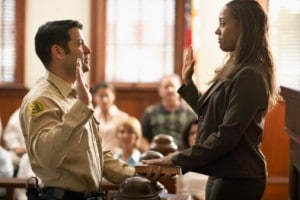
The Jury Selection Process Begins
The first step of jury selection is that the trial court judge requests a group of potential jurors to enter the courtroom from the jury assembly room (which is pretty much a waiting room). Immediately after entering the courtroom, the prospective jurors are required to swear that they will truthfully answer all questions asked of them about their qualifications to serve as jurors in the particular case at hand. This swearing is called the perjury admonishment (an authoritative statement made to the jury by the judge regarding their conduct as jurors, according to this website).
Perjury Admonishment
The text of the perjury admonishment is as follows: “Do you, and each of you, understand and agree that you will accurately and truthfully answer, under penalty of perjury, all questions propounded to you concerning your qualifications and competency to serve as a trial juror in the matter pending before this court, and that failure to do so may subject you to criminal prosecution?”
Questioning
Next, the court clerk calls groups of jurors to be questioned by both the judge and the attorneys working for the prosecution and the defense. The judge shares the names of the people involved in the case and what the case is about. The purpose of questioning the jurors is to determine any biases or prejudices that the juror may have that could affect their judgment of the case. Both attorneys and the judge are looking for people who will be as impartial as possible. This process is called voir dire, an old French phrase meaning “to speak the truth” or “to see them say.”
Excusing Jurors
If an attorney would like a juror to be excused from the jury, he or she may use a “challenge” and indicate a reason to dismiss a juror. There are two categories of challenges—for cause and peremptory. If a for cause challenge is made, it means that there is a specified reason given—for example, the juror is related to or employed by one of the parties in the case. A peremptory challenge is one where a reason is not provided. Each attorney may choose to excuse jurors, and it doesn’t mean anything bad or that those who are excused are incompetent. Often a juror will be excused from one case and accepted in another. There are unlimited challenges allowed for cause in every case, and a limit of 10 peremptory challenges in criminal cases (20 in death penalty or life imprisonment cases), and 6 in civil cases.
While a reason does not have to be given when exercising a preemptory challenge, preemptory challenges cannot be used to exclude people who belong to a protected group under the United States and California Constitutions. For example, preemptory challenges cannot be used to exclude women, African-Americans, people of a certain sexual orientation, etc. If one side believes that preemptory challenges are being used to exclude a constitutionally protected group, they can raise that issue with the judge outside the presence of the jury panel.
Completion of the Selection Process
The entire process of questioning and excusing jurors continues until 12 jurors have been accepted by both attorneys for the trial. More jurors may be selected to serve as alternates, in case someone needs to leave the jury. When all jurors have been selected, each one takes an oath.
Oath Text
Each juror takes the following oath that reads: “Do you, and each of you, understand and agree that you will well and truly try the cause now pending before this court, and a true verdict render according only to the evidence presented to you and to the instructions of the court?”
Meaning of Oath
This oath is very serious, and each juror needs to think about its repercussions before taking it. It means that the jurors promise to reach a verdict (formal decision made by the jury and reported to the court) based only on the evidence presented in the trial and the court’s instructions about the law. No outside evidence or instruction may be considered to determine the verdict. Each juror’s role is incredibly important to ensure justice is done.
Contact Us
Jury selection is an important part of the American justice system, and it’s a pretty simple process. If you have any questions about jury selection in your particular case, get in touch with top Southern California criminal defense attorney Dan Chambers by clicking the “Contact” tab above or calling 714-760-4088.




